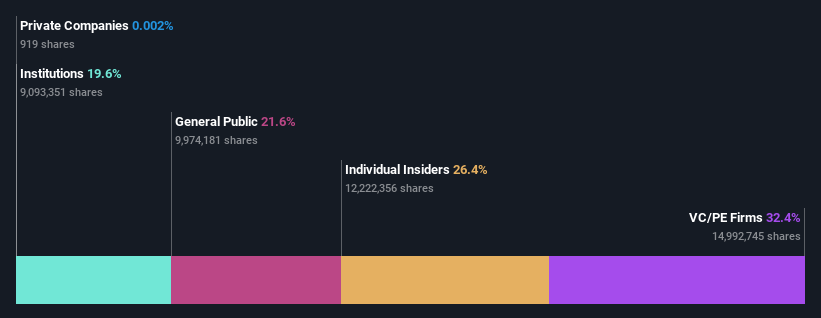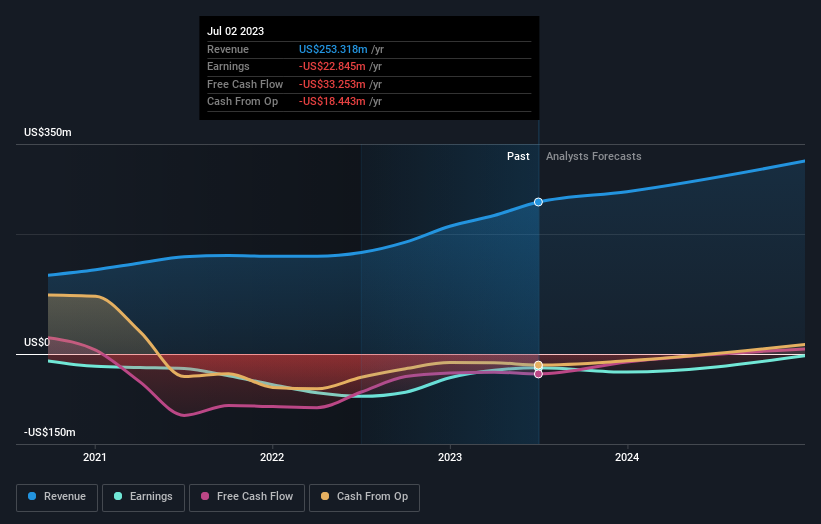- United States
- /
- Semiconductors
- /
- NasdaqCM:SKYT
Private equity firms are SkyWater Technology, Inc.'s (NASDAQ:SKYT) biggest owners and were hit after market cap dropped US$31m

Key Insights
- The considerable ownership by private equity firms in SkyWater Technology indicates that they collectively have a greater say in management and business strategy
- 52% of the business is held by the top 3 shareholders
- Insiders have been selling lately
To get a sense of who is truly in control of SkyWater Technology, Inc. (NASDAQ:SKYT), it is important to understand the ownership structure of the business. We can see that private equity firms own the lion's share in the company with 32% ownership. That is, the group stands to benefit the most if the stock rises (or lose the most if there is a downturn).
Following a 11% decrease in the stock price last week, private equity firms suffered the most losses, but insiders who own 26% stock also took a hit.
Let's delve deeper into each type of owner of SkyWater Technology, beginning with the chart below.
Check out our latest analysis for SkyWater Technology

What Does The Institutional Ownership Tell Us About SkyWater Technology?
Institutions typically measure themselves against a benchmark when reporting to their own investors, so they often become more enthusiastic about a stock once it's included in a major index. We would expect most companies to have some institutions on the register, especially if they are growing.
As you can see, institutional investors have a fair amount of stake in SkyWater Technology. This suggests some credibility amongst professional investors. But we can't rely on that fact alone since institutions make bad investments sometimes, just like everyone does. If multiple institutions change their view on a stock at the same time, you could see the share price drop fast. It's therefore worth looking at SkyWater Technology's earnings history below. Of course, the future is what really matters.

We note that hedge funds don't have a meaningful investment in SkyWater Technology. Oxbow Industries, LLC is currently the largest shareholder, with 32% of shares outstanding. For context, the second largest shareholder holds about 10% of the shares outstanding, followed by an ownership of 9.7% by the third-largest shareholder. Furthermore, CEO Thomas Sonderman is the owner of 1.0% of the company's shares.
A more detailed study of the shareholder registry showed us that 3 of the top shareholders have a considerable amount of ownership in the company, via their 52% stake.
Researching institutional ownership is a good way to gauge and filter a stock's expected performance. The same can be achieved by studying analyst sentiments. There are plenty of analysts covering the stock, so it might be worth seeing what they are forecasting, too.
Insider Ownership Of SkyWater Technology
While the precise definition of an insider can be subjective, almost everyone considers board members to be insiders. Management ultimately answers to the board. However, it is not uncommon for managers to be executive board members, especially if they are a founder or the CEO.
I generally consider insider ownership to be a good thing. However, on some occasions it makes it more difficult for other shareholders to hold the board accountable for decisions.
Our information suggests that insiders maintain a significant holding in SkyWater Technology, Inc.. Insiders have a US$65m stake in this US$248m business. This may suggest that the founders still own a lot of shares. You can click here to see if they have been buying or selling.
General Public Ownership
With a 22% ownership, the general public, mostly comprising of individual investors, have some degree of sway over SkyWater Technology. This size of ownership, while considerable, may not be enough to change company policy if the decision is not in sync with other large shareholders.
Private Equity Ownership
Private equity firms hold a 32% stake in SkyWater Technology. This suggests they can be influential in key policy decisions. Sometimes we see private equity stick around for the long term, but generally speaking they have a shorter investment horizon and -- as the name suggests -- don't invest in public companies much. After some time they may look to sell and redeploy capital elsewhere.
Next Steps:
I find it very interesting to look at who exactly owns a company. But to truly gain insight, we need to consider other information, too. Consider risks, for instance. Every company has them, and we've spotted 5 warning signs for SkyWater Technology you should know about.
Ultimately the future is most important. You can access this free report on analyst forecasts for the company.
NB: Figures in this article are calculated using data from the last twelve months, which refer to the 12-month period ending on the last date of the month the financial statement is dated. This may not be consistent with full year annual report figures.
New: Manage All Your Stock Portfolios in One Place
We've created the ultimate portfolio companion for stock investors, and it's free.
• Connect an unlimited number of Portfolios and see your total in one currency
• Be alerted to new Warning Signs or Risks via email or mobile
• Track the Fair Value of your stocks
Have feedback on this article? Concerned about the content? Get in touch with us directly. Alternatively, email editorial-team (at) simplywallst.com.
This article by Simply Wall St is general in nature. We provide commentary based on historical data and analyst forecasts only using an unbiased methodology and our articles are not intended to be financial advice. It does not constitute a recommendation to buy or sell any stock, and does not take account of your objectives, or your financial situation. We aim to bring you long-term focused analysis driven by fundamental data. Note that our analysis may not factor in the latest price-sensitive company announcements or qualitative material. Simply Wall St has no position in any stocks mentioned.
About NasdaqCM:SKYT
SkyWater Technology
Operates as a pure-play technology foundry that engages in the provision of semiconductor development, manufacturing, and packaging services in the United States.
Adequate balance sheet with moderate growth potential.


